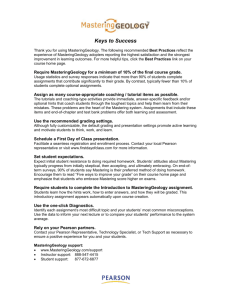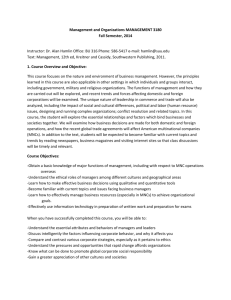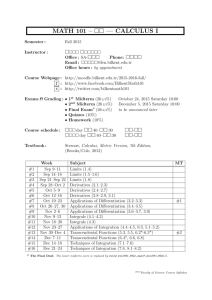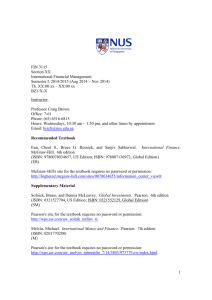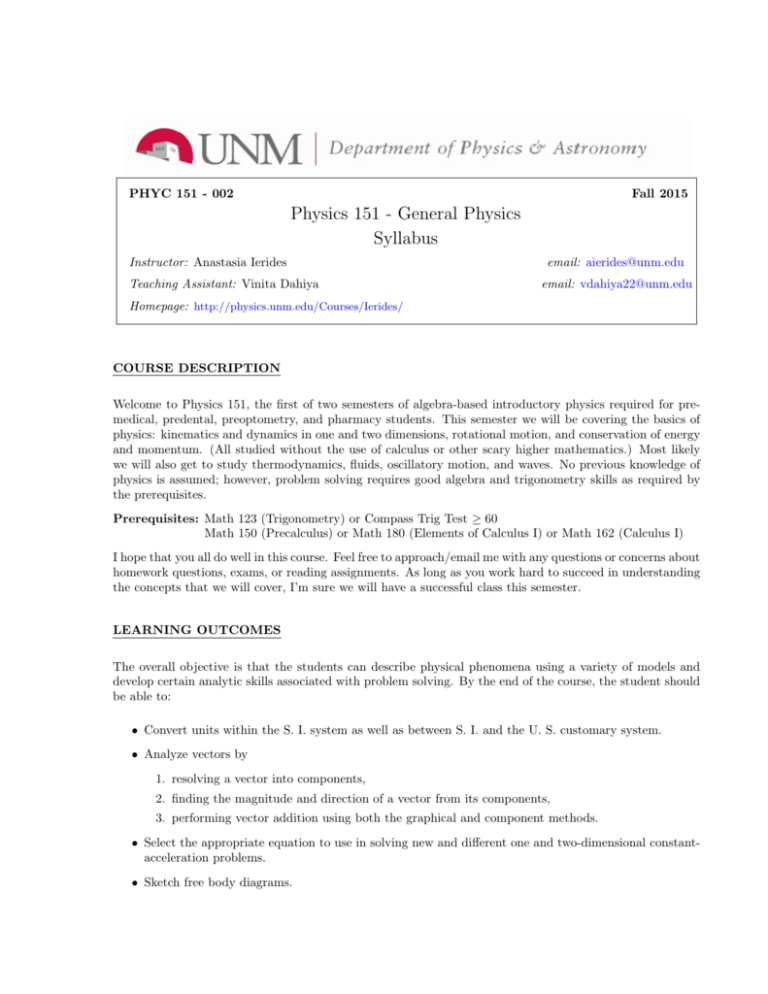
PHYC 151 - 002
Fall 2015
Physics 151 - General Physics
Syllabus
Instructor: Anastasia Ierides
Teaching Assistant: Vinita Dahiya
email: aierides@unm.edu
email: vdahiya22@unm.edu
Homepage: http://physics.unm.edu/Courses/Ierides/
COURSE DESCRIPTION
Welcome to Physics 151, the first of two semesters of algebra-based introductory physics required for premedical, predental, preoptometry, and pharmacy students. This semester we will be covering the basics of
physics: kinematics and dynamics in one and two dimensions, rotational motion, and conservation of energy
and momentum. (All studied without the use of calculus or other scary higher mathematics.) Most likely
we will also get to study thermodynamics, fluids, oscillatory motion, and waves. No previous knowledge of
physics is assumed; however, problem solving requires good algebra and trigonometry skills as required by
the prerequisites.
Prerequisites: Math 123 (Trigonometry) or Compass Trig Test ≥ 60
Math 150 (Precalculus) or Math 180 (Elements of Calculus I) or Math 162 (Calculus I)
I hope that you all do well in this course. Feel free to approach/email me with any questions or concerns about
homework questions, exams, or reading assignments. As long as you work hard to succeed in understanding
the concepts that we will cover, I’m sure we will have a successful class this semester.
LEARNING OUTCOMES
The overall objective is that the students can describe physical phenomena using a variety of models and
develop certain analytic skills associated with problem solving. By the end of the course, the student should
be able to:
• Convert units within the S. I. system as well as between S. I. and the U. S. customary system.
• Analyze vectors by
1. resolving a vector into components,
2. finding the magnitude and direction of a vector from its components,
3. performing vector addition using both the graphical and component methods.
• Select the appropriate equation to use in solving new and different one and two-dimensional constantacceleration problems.
• Sketch free body diagrams.
Physics 151 - General Physics
• Apply Newton’s laws of motions to solve for unknowns in new and different static and dynamics
problems.
• Apply conservation of momentum to predict characteristics of collisions.
• Use the law of conservation of energy in solving new and different motion problems.
• Apply the first law of thermodynamics to predict certain thermal responses of a substance.
• Calculate the pressure in a stationary fluid at arbitrary depths.
• Describe the fundamental properties of waves and periodic motion.
OFFICE HOURS
I will be available to provide additional tutoring and to help students with their homework by appointment
in person or by Skype. On Thursdays 18:30-19:20, I will be in room 103 of Regener Hall for the problems
session. I realize that these times will, most likely, be inconvenient to those students who have jobs or other
classes, and I encourage you to contact me to set up an appointment for a different time. Email is the best
and quickest way of contacting me. I will try my best to accommodate your schedule.
REQUIREMENTS
There are a few requirements to this course including materials, homework, exams, attendance, and quizzes.
The problems session that accompanies this course, Physics 157 - 002, is highly recommended, and may
sometimes be used for administering exams.
TEXT & MASTERING PHYSICS
The textbook used for this class is the third edition of
College Physics: A Strategic Approach
by Knight, Jones, and Field,
Pearson Addison-Wesley, 2015.
The second edition of the textbook is fine for the reading assignments, but a third-edition Mastering Physics access code is required.
Mastering Physics Course ID: PHYC151002FALL2015
CALCULATOR???
As this is an algebra based physics course, a graphing calculator is not necessary; however, a scientific
calculator with simple trigonometric functions such as sine, cosine, and tangent might be necessary on
homework and/or exams.
Physics 151 - General Physics
PERSONAL COMPUTER
For this course we will not be using I-Clickers; however, a smart-phone, laptop, or similar device that can
connect to Lobo Wi-Fi will be needed to encourage students to actively participate in the lecture. This
will act as a means of ensuring attendance as UNM has a strict attendance policy. Regular and punctual
attendance is required. Throughout each lecture, students will be given a series of conceptual or easy-tocalculate questions. Upon initially seeing the question, students are required to use their devices to answer
the question individually. Students will then discuss their answers with nearby classmates and the question
will be given again. Students who get the correct answer on the second try will receive three points while
students who still have an incorrect answer will receive two points. Non-attendance will result in zero points.
For each lecture, each student’s total points divided by that day’s maximum will give a daily percentage. At
the end of the term, your three lowest daily percentages will be dropped when determining your average. (If
a student does not have access to a personal device, the above method of attendance/participation grading
will be altered.)
Accommodation Statement: Accessibility Services (Mesa Vista Hall 2021, 277-3506) provides academic
support to students who have disabilities. If you think you need alternative accessible formats for undertaking
and completing coursework, you should contact this service right away to assure your needs are met in a timely
manner. If you need local assistance in contacting Accessibility Services, see the Bachelor and Graduate
Programs office.
HOMEWORK
Access to a computer is also necessary as much of the homework will be online through the Mastering Physics
website . Each week, I will be assigning 5-10 homework problems from the textbook and the Mastering
Physics website . The purpose of the homework is to make sure that you are keeping pace with the class
and understanding the topics being discussed. I encourage you to form study groups with other students in
this class and work on the homework together; physics is a collaborative subject. Homework assignments
will be a combination of online questions that will be collected using the Mastering Physics system, as well
as, written questions that will be turned in by the specified due date. You need to purchase an access code
to use Mastering Physics. Access codes are associated with the textbook. You must get a code associated
with the third edition of the textbook. Mastering Physics access codes can be obtained by purchasing a new
textbook, through the bookstore, or online. The course ID for this term is PHYC151002FALL2015. The
Mastering Physics assignments will be due by 11:59PM of the due date (usually Fridays). A late assignment
may still be done with an automatic 10% deduction for each day that it is late. Written assignments must
show all steps and should be neatly written. Each problem will be given partial credit based on the level of
completion and organization. Written assignments will be due at the beginning of class on the specified due
date.
Late written homework assignments may be turned in for a 65% participation grade. I do not drop a
homework score! Students are expected to do every problem assigned. It is highly recommended that you
do NOT give up on Mastering Physics problems. The penalty for doing so is always much higher than
attempting the problem multiple times.
EXTRA CREDIT: Shortly after each lecture, additional problems MAY be made available for students
on the Mastering Physics website . Students who answer these problems by the end of the next day will be
given extra credit. (Thursday’s extra credit problems are due Sunday evening.) At the end of the term,
students may earn a maximum of 5% increase in their final class average based on the number of problems
correctly answered. Extra-credit problems are based on effort. Unlike the homework, they do not take off
points for incorrect attempts. Solutions to the extra credit problems will be posted on the class’s website .
Physics 151 - General Physics
READING QUIZZES
Before every lecture, specific reading assignments will be posted on the class’s website . Students are expected
to read this material and then take a short (three or four question) online quiz about that material on the
Mastering Physics website . They will be posted a day in advance and are due by 11:59 PM of the evening
prior to lecture. There is no time limit on the quizzes (in fact, students are encouraged to look back in the
textbook when they do not know the answer to a question), but any answers submitted after 11:59 PM will
receive no credit. When determining your average at the end of the term, your three lowest reading quizzes
will be dropped.
EXAMS
There will be four in-class exams given throughout the semester. (See schedule for dates.) Exams will consist
of some (to be determined) combination of multiple choice and written questions. Your lowest exam score
will be dropped when determining your exam average. A review session will be provided if enough students
request it.
Final Exam: An in-class, comprehensive final exam will be given on Tuesday, December 8, 2015, from 5:30
PM until 7:30 PM. In the event of a UNM closure on the date of the final exam, final grades for students
will be calculated based upon the work assessed up to that point.
GRADING
At the end of the semester, the course grade will be calculated based upon the following percentages. In
the case that the average of all four exam grades exceeds the homework average, that higher average will be
used for your homework score.
Reading Quiz: 5%
Attendance & Participation: 10%
Homework: 25%
Exams: 45%
Final Exam: 15%
Letter grades will
A+: 99-100%
B+: 87-89.99%
C+: 77-79.99%
D+: 67-69.99%
be assigned according to the following scale:
A: 93-98.99% A-: 90-92.99%
B: 83-86.99% B-: 80-82.99%
C: 73-76.99% C-: 70-72.99%
D: 63-66.99% D-: 60-62.99%
COURSE CALENDAR
Here is the listing of some important dates in terms of registration, lectures, and exams. This schedule is not
set in stone, as things do come up, but it is a good estimate of the general topics that will be covered and
when exams will be administered. Students should consult the class website for specific information about
which sections of each chapter will be covered during a particular class and for any schedule changes.
Physics 151 - General Physics
WEEK
1
2
3
4
DATE
Aug 18
Aug 20
Aug 25
Aug 27
Aug 28
Sep 1
Sep 3
Sep 4
Sep 7
Sep 8
Sep 10
5
6
7
8
9
11
12
13
14
15
16
17
Sep 15
Sep 17
Sep 22
Sep 24
Sep 29
Oct 1
Oct 6
Oct 8
Oct 13
Oct 15
Oct 20
Oct 22
Oct 27
Oct 29
Nov 3
Nov 5
Nov 6
Nov 10
Nov 12
Nov 17
Nov 19
Nov 24
Nov 26
Dec 1
Dec 3
Dec 4
18
Dec 8
TOPIC
Syllabus/Intro to Motion
Ch. 1 - Representing Motion
Ch. 2 - Motion in One Dimension
Ch. 2 (continued)
Last day to add classes, change credit hours or grade mode online on LoboWEB
Ch. 3 - Vectors and Motion in Two Dimensions
Ch. 3 (continued)
Last day to drop with 100% refund
Labor Day
Ch. 4 - Forces and Newton’s Laws of Motion
Exam 1 ?
Ch. 4 (continued)
Ch. 5 - Applying Newton’s Laws
Ch. 5 (continued)
Ch. 6 - Circular Motion, Orbits, and Gravity
Ch. 6 (continued)
Ch. 7 - Rotational Motion
Ch. 7 (continued)
Exam 2
Fall Break
Ch. 8 - Equilibrium and Elasticity
Ch. 9 - Momentum
Ch. 9 (continued) & Beginning Ch. 10 - Energy and Work
Ch. 10 (continued)
Ch. 11 - Using Energy
Exam 3
Ch. 12 - Thermal Properties of Matter
Ch. 12 (continued)
Last day to Drop without Dean’s Permission on LoboWEB
Ch. 13 - Fluids
Ch. 13 (continued)
Ch. 14 - Oscillations
Ch. 14 (continued)
Exam 4
Thanksgiving
Ch. 15 - Traveling Waves and Sound
Ch. 15 (continued)
Last Day to change grade mode with form
Last Day to drop with Dean’s permission with form
Final Exam
5:30 - 7:30 pm


